

Organizing, and learning with, group projects. Cooperative learning series Learning and working in groups involves shared and/or learned values, resources, and ways of doing things.
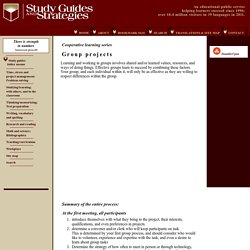
Effective groups learn to succeed by combining these factors. Your group, and each individual within it, will only be as effective as they are willing to respect differences within the group. Summary of the entire process: At the first meeting, all participants Process stages: Research discovery: library, Internet, professional associations, experts, etc. More(!) Interaction within the group is based upon mutual respect and encouragement. The two major objectives of a group project are: What is learned: factual material as well as the process What is produced: written paper, presentation, and/or media project Role of instructors/teachers/professors: Outcomes depend on the clarity of the objective(s) given by teachers. Web Tools for Collaboration. Group projects can cause a lot of stress for everyone involved.
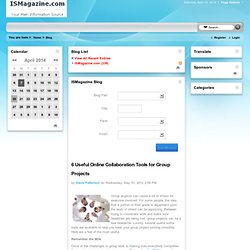
For some people, the idea that a portion of their grade is dependent upon the work of others can be agonizing. 7 Tools Students Can Use to Manage Group Projects. Any teacher who has assigned group projects to students has at some point had to help those students organize and equitably distribute work.

(Or has had to listen to students complaints about other group members not pulling their weight). Here are some tools that you can have students use to manage their responsibilities when working on group projects. Pegby is a good website for organizing the tasks that you and or your team need to get done. Pegby is set up like a corkboard with index cards stuck to it. The corkboard has three columns to place your index cards on. 50 Fabulous Web Tools for Group Projects. Group Project Tools - Enhancing Education. Here are different group project tools you might consider adopting or adapting for use in your own courses.
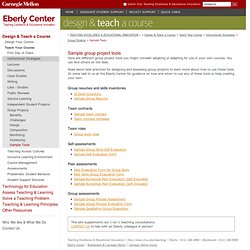
You can find others on the Web. Assessing Group Work - Enhancing Education. All of the basic principles of assessment that apply to individual work apply to group work as well.
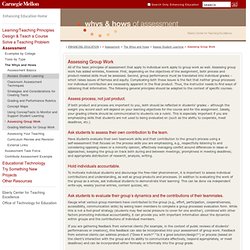
Assessing group work has added wrinkles, however. First, depending on the objectives of the assignment, both process and product-related skills must be assessed. Second, group performance must be translated into individual grades – which raises issues of fairness and equity. Complicating both these issues is the fact that neither group processes nor individual contribution are necessarily apparent in the final product. Thus, the instructor needs to find ways of obtaining that information. Assess process, not just product. If both product and process are important to you, both should be reflected in students’ grades – although the weight you accord each will depend on your learning objectives for the course and for the assignment. Ask students to assess their own contribution to the team.
Hold individuals accountable. Grading Methods for Group Work - Enhancing Education. Assessing Student Learning - five practical guides. Probably not, for the 'best' model depends much on the context.
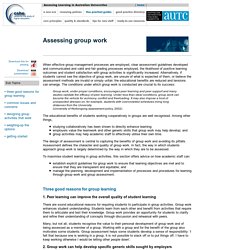
One view is that imposing one or other model may impede learning and prevent effective cooperation. On the other hand, some students may prefer to be guided by a clear model. There are many approaches that are possible. Some groups, for example, might prefer to meet within a formal structure with agendas, resolutions and minutes; others may prefer a series of informal discussion groups. Resistance. Using Group Work Effectively. Group Work Materials - Roanoke College - Salem, Virginia. Preparing students for Group Work Group Resume: Asks groups to discuss their individual skills and experiences.
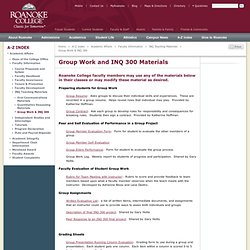
These are recorded in a group resume. Helps reveal roles that individual may play. Provided by Katherine Hoffman. How to Succeed in Group Work. Group Work in College: How to Survive School Group Projects. Teachers, professors and even bosses love to claim that collaborative group projects are beneficial to all parties involved.
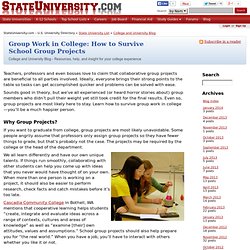
Ideally, everyone brings their strong points to the table so tasks can get accomplished quicker and problems can be solved with ease. Sounds good in theory, but we’ve all experienced (or heard horror stories about) group members who didn’t pull their weight yet still took credit for the final results. Why Group Work? Group activities are used by many instructors on campus.
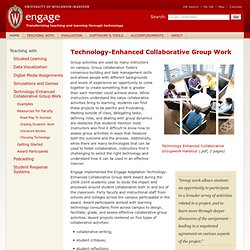
Group collaboration fosters consensus-building and task management skills and allows people with different backgrounds and levels of experience an opportunity to come together to create something that is greater than each member could achieve alone. While instructors understand the value collaborative activities bring to learning, students can find these projects to be painful and frustrating. Meeting outside of class, delegating tasks, defining roles, and dealing with group dynamics are obstacles that students mention most. Designing/Facilitating Group Work. How do I design and facilitate group work?

Finding time to meet, integrating individual contributions, delegating tasks, and dealing with group dynamics were chosen by over 800 students as the top challenges in completing group assignments (TECGW student pre-survey). Research indicates the manner in which an instructor facilitates a group project has a significant impact on the success of the group project*.
The Technology Enhanced Collaborative Group Work (TECGW) Award combined collaborative technologies and research-based facilitation strategies with the goal of improving the group project experience for students and instructors. The evaluation data confirmed the importance of integrating research-based facilitation strategies and choosing the right technology in helping students get the most out of the group experience. The methods of good practice below are a synthesis of the research-literature and the Engage TECGW evaluation findings. Part 2: Effective Group Work in College Science Classrooms (Part 2) Group Work, 1. The 5 Personalities of Group Work: Optimizing Teamwork in College and at the Office. Ever since Vygotsky cooked up his ZPD theory, college professors have been using group work to facilitate learning and to spark new ideas. Unfortunately, Vygotsky didn’t leave any instructions for how to deal with the slackers and the loudmouths, who can sink group grades faster than you can spell, collaborate.
Meanwhile, group work doesn’t always get easier after graduation. Somehow those same personalities that muck up your college projects find a way into the working world. Before you know it, you’re scrambling to pull someone else’s weight again. Or you’re trying not to cry in the middle of the conference room. But you don’t have to endure these difficult dynamics. The Tyrant Every group should have a leader.
Here’s the thing: some people prefer to be in charge because they’re uncomfortable with loose ends and unknowns. The Social Butterfly It’s always nice to talk about your weekend plans, your daughter’s dance recital, your opinion of last night’s American Idol. The One Trick Pony. Using Group Projects Effectively - Enhancing Education. The Trouble with College Group Work. Throughout my college career at the University of Washington Bothell, there was no end of bellyaching about group work. Personally, I found group work in most classes to be very painful and low in educational value.
I completely understand the motivation for Universities to include group work as a core teaching tool for every class. It teaches many skills required to work in the professional world. As one of my Professors, Steve Schroeder, said a few years back, “In the working world, group work is the norm.” However, in the working world certain practices and conventions aid the group work process: